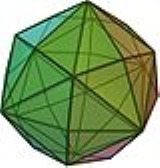
Disdyakis dodecahedron
Encyclopedia
| Disdyakis dodecahedron | |
|---|---|
 Click on picture for large version Spinning version |
|
| Type | Catalan Catalan solid In mathematics, a Catalan solid, or Archimedean dual, is a dual polyhedron to an Archimedean solid. The Catalan solids are named for the Belgian mathematician, Eugène Catalan, who first described them in 1865.... |
| Face polygon | scalene triangle |
| Faces | 48 |
| Edges | 72 |
| Vertices | 26 = 6 + 8 + 12 |
| Face configuration Face configuration In geometry, a face configuration is notational description of a face-transitive polyhedron. It represents a sequential count of the number of faces that exist at each vertex around a face.... |
V4.6.8 |
| Symmetry group | Oh, [4,3], *432 |
| Dihedral angle Dihedral angle In geometry, a dihedral or torsion angle is the angle between two planes.The dihedral angle of two planes can be seen by looking at the planes "edge on", i.e., along their line of intersection... |
155° 4' 56" |
| Dual polyhedron Dual polyhedron In geometry, polyhedra are associated into pairs called duals, where the vertices of one correspond to the faces of the other. The dual of the dual is the original polyhedron. The dual of a polyhedron with equivalent vertices is one with equivalent faces, and of one with equivalent edges is another... |
truncated cuboctahedron Truncated cuboctahedron In geometry, the truncated cuboctahedron is an Archimedean solid. It has 12 square faces, 8 regular hexagonal faces, 6 regular octagonal faces, 48 vertices and 72 edges... |
| Properties | convex, face-transitive |
 Net Net (polyhedron) In geometry the net of a polyhedron is an arrangement of edge-joined polygons in the plane which can be folded to become the faces of the polyhedron... |
|
In geometry
Geometry
Geometry arose as the field of knowledge dealing with spatial relationships. Geometry was one of the two fields of pre-modern mathematics, the other being the study of numbers ....
, a disdyakis dodecahedron, or hexakis octahedron, is a Catalan solid
Catalan solid
In mathematics, a Catalan solid, or Archimedean dual, is a dual polyhedron to an Archimedean solid. The Catalan solids are named for the Belgian mathematician, Eugène Catalan, who first described them in 1865....
and the dual to the Archimedean
Archimedean solid
In geometry an Archimedean solid is a highly symmetric, semi-regular convex polyhedron composed of two or more types of regular polygons meeting in identical vertices...
truncated cuboctahedron
Truncated cuboctahedron
In geometry, the truncated cuboctahedron is an Archimedean solid. It has 12 square faces, 8 regular hexagonal faces, 6 regular octagonal faces, 48 vertices and 72 edges...
. As such it is face-transitive but with irregular face polygons. It looks a bit like an inflated rhombic dodecahedron
Rhombic dodecahedron
In geometry, the rhombic dodecahedron is a convex polyhedron with 12 rhombic faces. It is an Archimedean dual solid, or a Catalan solid. Its dual is the cuboctahedron.-Properties:...
—if one replaces each face of the rhombic dodecahedron with a single vertex and four triangles in a regular fashion one ends up with a disdyakis dodecahedron. More formally, the disdyakis dodecahedron is the Kleetope
Kleetope
In geometry and polyhedral combinatorics, the Kleetope of a polyhedron or higher-dimensional convex polytope is another polyhedron or polytope formed by replacing each facet of with a shallow pyramid...
of the rhombic dodecahedron.
Symmetry
It has Oh octahedral symmetryOctahedral symmetry
150px|thumb|right|The [[cube]] is the most common shape with octahedral symmetryA regular octahedron has 24 rotational symmetries, and a symmetry order of 48 including transformations that combine a reflection and a rotation...
. Its collective edges represent the reflection planes of the symmetry.
 |
Dimensions
If its smallest edges have length 1, its surface area is and its volume is
and its volume is  .
.See also
- Disdyakis triacontahedronDisdyakis triacontahedronIn geometry, a disdyakis triacontahedron, or hexakis icosahedron is a Catalan solid and the dual to the Archimedean truncated icosidodecahedron. As such it is face uniform but with irregular face polygons...
- Bisected hexagonal tiling
- Great rhombihexacronGreat rhombihexacronIn geometry, the great rhombihexacron is a nonconvex isohedral polyhedron. It is the dual of the uniform great rhombihexahedron . It has 24 identical bow-tie-shaped faces, 18 vertices, and 48 edges....
—A uniform dual polyhedron with the same surface topology
External links
- Disdyakis Dodecahedron (Hexakis Octahedron) Interactive Polyhedron Model

